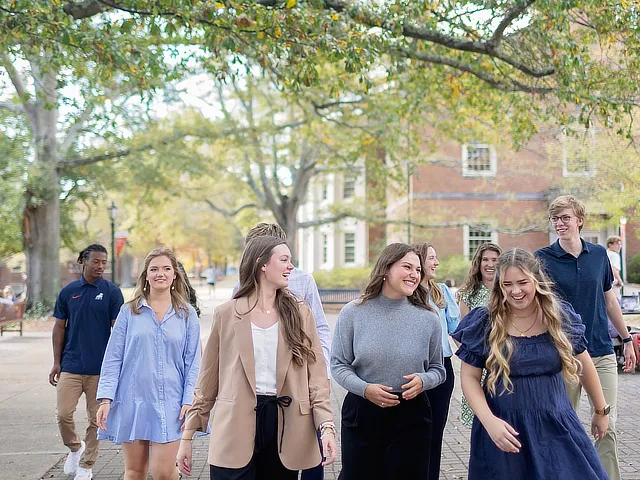
What makes Samford University’s Orlean Beeson School of Education different? While the possible answers to this question are limitless, Laura Casey ’23, a graduate of the School of Education’s Master of Science in instructional leadership, would tell you it is character.
“To me, character education is not an option. I believe that intentional character development is the core of education. When our students go out into the world, if we have not shown and taught them kindness, honesty, empathy and grit among other things, then we have failed,” said Casey.
Educating for character is the process equipping students and adults to understand, care about and act on shared ethical values. Values such as respect, justice, citizenship and responsibility for self and others shape attitudes and form actions. The resulting behaviors have been proven to be hallmarks of safe, healthy and informed communities.
“Culture matters,” said Casey. “When character education is intentional and repeated, it becomes part of the fabric of a classroom and ultimately a school.”
According to Casey, significant and positive impacts to learning environments have been seen in places where character education has been intentionally and continuously implemented.
In the 2022 edition of Leadership, Research & Innovation in Education, Blair Inabinet ’21, principal of Liberty Park Middle School, researched the importance of character education in schools where it was prioritized and regularly practiced.
Her findings led her to an important conclusion. “Our work with character is not about promoting any value system at the expense of others, it's not about elevating certain beliefs above others, and it's not about spotlighting some kind of educational trend,” Inabinet said. “It's about working with kids who are developmentally learning how to function as human beings. If we don't recognize that it's important for us to guide them through how to make good decisions and good choices for themselves and in partnership with others, we’re missing a really valuable opportunity.”
Graduates of Orlean Beeson School of Education are determined not to miss this valuable opportunity. Education alumni consistently affirm that the solutions our schools, families and communities need can be found in the determined and intentional career preparation and character education of Orlean Beeson School of Education.
“To me character education has been the way I can intertwine the virtues of my faith and teach in the public-school setting. Knowing there is something far more important or ‘bigger’ than teaching techniques of a sport, balancing an equation or winning a game has been a crucial part of the drive that keeps me going as an educator and gives me the courage and humility to keep working on character,” said Casey. “Thankfully I have been in education long enough to see some of those character seeds that were planted long ago grow in my student's lives. Seeing just a glimpse of that fruit encourages me to continue serving kids.”
Character initiatives in Orlean Beeson School of Education, and in communities across the globe, have never been of greater significance. The work of the Department of Educational Leadership is meeting the challenge of equipping ethical leaders, while the Teacher Education Department is faithfully seeking to address the national teacher shortage by producing high quality educators fit to handle the complex and challenging learning environments of today’s field. Furthermore, character initiatives within the Department of Human Development and Family Science are fueling ethical and empowered social workers, counselors, family and child advocates, psychologists and workers in government and community agencies.
“Our school’s work with virtues and character development is vital in producing top quality graduates in our fields. The environments we send our alumni into are foundational to ensuring our schools, families, and communities continue to grow and thrive,” said Anna McEwan, dean of Orlean Beeson School of Education. “When we faithfully cultivate virtues in our students, we are blessed to witness the ripple effect of our efforts. We are engaged in work that makes the world a better place and advances the kingdom of God.”
The importance of character education is the reason Orlean Beeson School of Education has declared the character development fund its priority for this Samford Giving Day.
Giving Day is Samford’s 24-hour collaborative effort to financially support areas across the university. The annual fundraising initiative exists so that the entire community—students, alumni, parents, employees and friends—can come together to support and further Samford’s mission.
Orlean Beeson School of Education’s character development fund prioritizes the work of virtues development and character education as a foundational element of the school’s culture. Funds raised through Samford Giving Day will support practical applications such as service events, trainings and conferences, curriculum development and innovative projects designed to create school cultures and communities of character, furthering the school’s mission.
“This Samford Giving Day we are humbly asking all, not just our alumni, but anyone passionate about this work to contribute to Samford’s School of Education’s mission to make the world a better place through character education,” said McEwan. “It is clear to many that what our societies are in desperate need of are ethical and moral values that are proven to elevate and prioritize safety and well-being. When you support this work and our students, you are supporting the physical, emotional, mental and spiritual health of our nation’s children and families.”
Learn more about Character Education.
Give now to the Character Development Fund.
